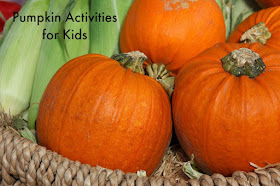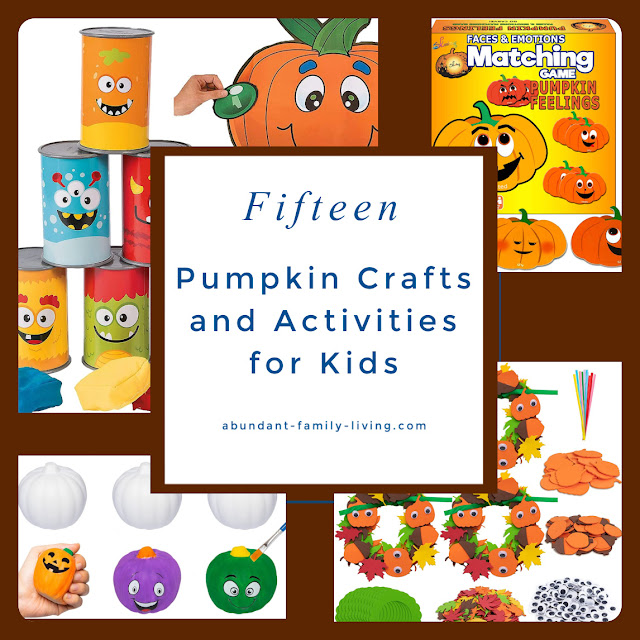 |
| Image Credit – PublicDomainPictures/18043 – CCO Public Domain Image – via Pixabay |
Pumpkin Activities for Kids
Kids love visiting pumpkin farms
and picking out that special pumpkin. Sometimes those special treasures
are large and end up on the family front porch. Sometimes they
are small and end up, as was true when my own children were small,
rotting in a toy box or at the back of a closet . . . only to be found
sometime in November or December when someone noticed an odor.
Wipe-Off Pumpkins
Each child needs a small pumpkin and either washable markers or dry-erase markers. The children can write messages on their pumpkins and then wipe them off. Baby wipes make great “erasers.”
Children can draw
faces, create make-believe characters, or just color them. They may
choose to leave it as it is or they can wipe it off and start all over.
Easily frustrated children and little perfectionists benefit from
wipe-off pumpkins because they can keep wiping off and starting over
until they get it just the way they want it. Children can practice
writing letters and numbers. They can practice solving math problems.
These are great for trial and error activities because children can wipe
off their errors and try again. Teachers can use a large wipe-off
pumpkin in the front of their classrooms. Write daily announcements,
student awards, or daily challenge questions – just to name a few ideas.
Create a “Wipe-Off Center” in your classroom or home for children to
enjoy during center time. Supply the center station with a couple of
pumpkins of various sizes, a box of washable or dry-erase markers, a box
of baby wipes, and a trash can for disposing of used wipes. Have fun
with this idea!
Musical Instruments: Drums
Pumpkins are hallow. If you beat on one with your hands or a drum stick, you will recognize the drumming sound. Gather several different sizes and allow each child to strike each one with his hand as if striking a regular drum. Then allow each child to strike the pumpkin with a drum stick. Remind the children to strike with care so they don’t damage it. After each child has had a chance to hear the pumpkin drum sounds, arrange the pumpkins together in a group to create a “drum set.” Give each child, or perhaps groups of children, an opportunity to create their own musical masterpieces. Once they have perfected their musical routine, give them a chance to perform for the rest of the class.
If you want to get especially creative with this, you
can divide the class into groups and give each group a pumpkin drum set.
Allow each group to paint their pumpkins and arrange them in a drum
line. Allow the groups to name their group, set up their painted pumpkin
drum line, and perform for different groups within the school.
Bowling with Pumpkins
Collect toilet paper rolls. You can use them after all the paper is gone or you can use them with the paper still on. Stack the toilet paper up to create a pyramid. You should have three rolls on the bottom, two positioned on top of the three bottom rolls, and then one lone roll on top. You can create more pyramid levels if you wish but three works just fine with younger children. Stack the toilet paper pyramid so that you have a little bit of space behind it. You don’t want to stack it against a wall or piece of furniture. Allow the children to roll a small or medium sized pumpkin into the toilet paper pyramid and count how many rolls fall down. You can divide the children up into teams and keep score for several rounds.
If you like, you can substitute the toilet paper rolls with cans. Just remember . . . cans make a lot more noise. You can use empty soup cans or paint cans, depending on how large you want the pyramid. You can paint the cans orange or decorate them for the fall season.
Do Pumpkins Sink or Float?
Pumpkins are heavy. Even small pumpkins are heavy for their size. Fill a container with water. The container should be large enough to accommodate enough water to experiment with a small pumpkin. Ask each child to hold and feel the weight of the pumpkin. Then, ask the child to guess whether or not the pumpkin will sink or float. The child will usually guess the pumpkin will sink because it feels heavy. Instruct the child to place the pumpkin into the water. Most children will be surprised to see the pumpkin float. Explain to the children that pumpkins are hallow. For older children, you can expand this lesson and explain density of water and density of pumpkins. Some younger children may be able to grasp the concept of density as well.
Finally, cut the top from the pumpkin and allow the children to scoop out the pumpkin fruit and seeds so that they can see the inside of the hallow pumpkin.
Pumpkin Weight Station
Set up a pumpkin weight station. Include pumpkins of several different weights and sizes, a set of scales like bathroom scales, paper, pencils, and a calculator. Instruct the children who visit the station to weigh a pumpkin and then weigh themselves. Then, guess how many pumpkins it would take to equal their own weights. Tell them to try this with several different pumpkins. They may use the paper, pencils, and acalculator to calculate their answers.
 |
| Pumpkin Crafts and Activities for Kids |
